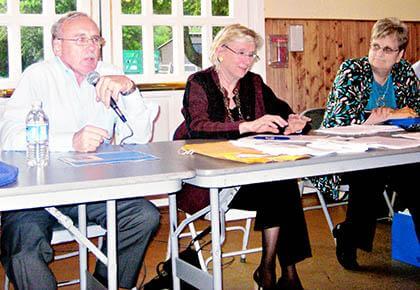By Howard Koplowitz
In preparation for ballot initiatives that may be coming to voters in November, the Queens Civic Congress held a panel discussion Monday night about some topics, including term limits and the roles of borough presidents and community boards, that may come before voters as a result of the City Charter revision process.
In March, Mayor Michael Bloomberg appointed members to the Charter Revision Commission, which is responsible for deciding which issues will be on the ballot that can only be changed through the Charter, the city equivalent of the U.S. Constitution.
Lorna Goodman, executive director of the commission, said the body has held public hearings in the five boroughs this year with five more beginning July 19.
After that, Goodman said, the commission will issue a final report followed possibly by one more citywide hearing before the initiatives appear on the ballot in November.
Goodman said a question about term limits may be on the ballot, but she said the commission has not yet decided on the language of the question.
Richard Hellenbrecht, executive vice president of the QCC, said his concern was that any changes to the charter “cannot take away from the independence that we have” in the borough.
Hellenbrecht said he also wanted borough presidents to have a stronger say and more power over how to fund projects in their boroughs.
“Anything that takes away from that is just wrong and I’m here to fight for it,” he said.
Alex Rosa, chief of staff and budget director for Borough President Helen Marshall, said the borough has been shortchanged in funding for cultural institutions, libraries and the borough president’s office.
Rosa said Marshall’s office is funded at $2.12 per capita — the lowest of the five boroughs. Staten Island is funded at $8.73 per capita and the citywide average is $2.99 per capita, she said.
Funding for cultural institutions in Queens is $1.76 per capita, while the citywide average is $6.27 per capita, Rosa said.
And Queens libraries, the busiest in the nation, receive $77,000 less per branch than libraries in Brooklyn, she said.
Rosa said all boroughs should be treated equally, although Manhattan should be funded at a higher rate because of its cultural institutions.
“We think that’s a great model … so that this kind of inequity Queens faces … that ought to be rectified,” she said.
When asked if centralization was good or bad for the city, Goodman said there was no suggestion from the mayor that services be centralized and said Bloomberg was not influencing the commission.
Hellenbrecht said the boroughs are “too complex for centralized services” and contended there should be a Board of Standards and Appeals and Landmarks Preservation Commission — which are based in Manhattan — for each borough.
There was speculation that abolishing the office of borough president may be one of the questions asked in November. Rosa said the offices are needed.
“When you starve borough presidents’ offices, you starve independent voices in the boroughs,” she said.
Following the discussion, the Queens Civic Congress adopted a statement of principles on charter reform, which included support for partisan elections, ensuring that any change to term limits come through voter referendum and that there be baseline funding for community boards and borough presidents’ offices based on population.
It also supported making the office of city councilmen a full-time position and that member items be distributed equally.
Reach reporter Howard Koplowitz by e-mail at hkoplowitz@cnglocal.com or by phone at 718-260-4573.



































